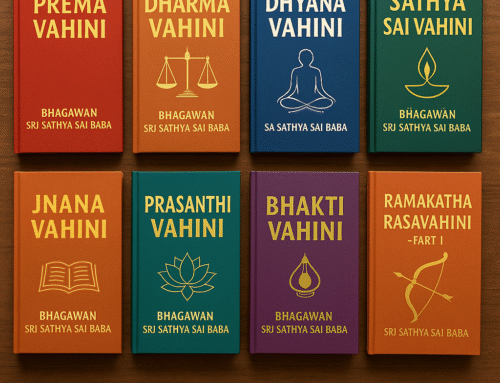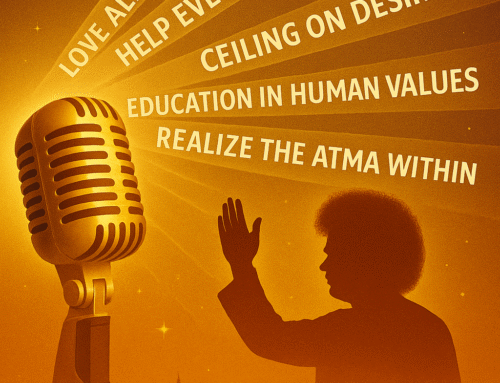Deepavali—A Festival of Light for All Humanity
Deepavali, or Diwali, is one of the most radiant and widely celebrated festivals in the world. While its roots lie in Hindu tradition, its universal message of light conquering darkness, wisdom dispelling ignorance, and love overcoming hatred resonates with people of all faiths. Today, it is celebrated not only in India but across the globe, uniting communities and cultures in a shared celebration of hope.
At its core, Deepavali is more than fireworks, sweets, and lights—it is a reminder of the eternal flame within, the Atma Jyoti, which illuminates our lives with truth, peace, and compassion.
History and Mythology
The origins of Deepavali are drawn from India’s sacred epics and Puranas, with each region highlighting different stories:
- Rama’s Return – In the Ramayana, the people of Ayodhya welcomed Rama, Sita, and Lakshmana after their exile and Ravana’s defeat. Lamps lit across the city symbolized the return of righteousness and divine effulgence.
- Krishna and Narakasura – In South India, Deepavali marks Lord Krishna and Satyabhama’s victory over Narakasura, who had imprisoned thousands. Naraka Chaturdashi thus signifies liberation from cruelty and ignorance.
- Vamana and Bali – The Bhagavata Purana narrates how Vishnu, in his dwarf incarnation, humbled King Bali’s pride. Deepavali here becomes a reminder of humility over ego.
- Shakti and Shiva – The Skanda Purana tells of Shakti’s austerities culminating in Lord Shiva accepting her as half His being—manifesting as Ardhanarishvara, the union of divine energies.
- Historical Events – Traditions also recall Emperor Vikramaditya’s coronation, linking the festival with righteous rule and cultural pride.
Each story, though different, carries the same essence: the victory of light, truth, and humility over darkness, arrogance, and evil.
Spiritual Meaning
The lamps of Deepavali are not merely decorative—they symbolize the dispelling of ignorance and the illumination of wisdom. The Brihadaranyaka Upanishad prays:
“तमसो मा ज्योतिर्गमय” (tamaso mā jyotir gamaya)
Lead me from darkness to light.
Sri Sathya Sai Baba explained, “The lamp outside is a symbol. The true lamp is within. Fill it with the oil of devotion, use steadiness as the wick, and light it with the flame of love. Then the darkness of ignorance will vanish.”
The lamp itself conveys spiritual lessons:
- Heart as the container
- Devotion as the oil
- Concentration as the wick
- Renunciation as the flame
When kindled, it burns away the six inner enemies—desire, anger, greed, attachment, pride, and envy—and allows the Self to shine forth.
Swami Chinmayananda saw the bursting of crackers as the bursting of ego and cleaning homes as symbolic of cleansing the mind. Swami Rama emphasized meditating on the flame: “The outer flame awakens the inner flame, which guides you through storms.” Osho interpreted Deepavali as awakening consciousness: “Light the house of your being with awareness; then life itself becomes a festival.” Thus, spiritually, Deepavali is a call to awaken, to let the divine light within illumine our actions.
Practical Reasons
Deepavali also has practical value in daily life:
- Cleansing and Renewal – Homes are cleaned, repainted, and decorated, symbolizing inner and outer purification.
- Family Unity – Sweets, gifts, and visits strengthen bonds of affection and forgiveness.
- Social and Economic Vibrancy—Markets bustle, artisans thrive, and traders mark fresh beginnings on Dhanteras.
- Health Benefits—Traditionally, mustard oil lamps doubled as insect repellents, and seasonal foods prepared during the festival nourished the body for winter.
- Charity and Service—Deepavali inspires giving to the less fortunate. Sai Baba reminded us, “The real wealth is compassion and service.”
- Eco-Awareness—In our age, eco-friendly celebrations with clay lamps and minimal fireworks reflect Deepavali’s harmony with nature.
These practices remind us that the festival is not only a spiritual observance but a renewal of family, society, and environment.
Deepavali Across Religions
Although celebrated primarily in Hindu tradition, Deepavali finds resonance across faiths:
- Hinduism—The return of Rama, Krishna’s victory, and the awakening of the Atma Jyoti.
- Jainism—Commemorates Lord Mahavira’s Nirvana, the soul’s liberation into eternal light.
- Sikhism – Marks Guru Hargobind Ji’s release from prison, celebrated as Bandi Chhor Divas, symbolizing freedom and justice.
- Christianity—Jesus said, “Let your light so shine before men” (Matthew 5:16). The essence of Deepavali mirrors this call to radiate goodness.
- Islam—The Quran declares: “Allah is the Light of the heavens and the earth” (24:35). The lamp of Deepavali symbolizes the same divine illumination.
- Buddhism—Among Newar Buddhists in Nepal, Diwali honors Lakshmi, combining devotion with reflection on compassion.
This interfaith harmony shows that Deepavali is not confined to one religion—it is humanity’s collective reminder of the divine light in every heart
A Global Celebration
Deepavali today is celebrated across the world, embraced by nations and cultures beyond India:
- In Nepal, it is observed as Tihar, honouring not only deities but also animals and family bonds.
- In Sri Lanka, Myanmar, and Mauritius, it blends with local traditions.
- Across the Indian diaspora—in Fiji, Trinidad, Suriname, Guyana, Singapore, and Malaysia—it is a national holiday.
- In London, New York, Toronto, Sydney, and Auckland, Deepavali lights up public squares, city halls, and parliaments.
- The United Nations observes Deepavali as a day of peace and light, affirming its global relevance.
Why has Deepavali spread so widely? Because its core message—light over darkness, hope over despair, unity over division—is universal.
Why Does Deepavali Matter Today?
In a world often plagued by violence, loneliness, and ecological imbalance, Deepavali’s timeless message is deeply relevant:
- For the Individual—It urges us to conquer inner negativity and cultivate wisdom and compassion.
- For Families—It restores harmony, forgiveness, and togetherness.
- For Society—It encourages service, charity, and justice.
- For the world—it symbolizes the shared light of humanity, reminding us that peace begins with each heart.
Sri Sathya Sai Baba captured this universal call: “Celebrate Deepavali by lighting the lamp of love in your hearts. When every heart shines, the world will be full of peace.”
Conclusion – A Festival for All Humanity
Deepavali is at once historical, spiritual, practical, and universal. It remembers Rama’s return to Ayodhya, Krishna’s triumph over Narakasura, and Mahavira’s enlightenment. It calls us to clean our homes and hearts, to burst the ego, to share love and service, and to honour the divine in all beings.
It is not only a Hindu festival—it is also the Jain’s liberation, the Sikh’s freedom, the Christian’s light, the Muslim’s divine radiance, and the Buddhist’s compassion. Above all, it is humanity’s celebration of oneness.
When we light a lamp at Deepavali, we are reminded that the same flame shines in every heart. In a fractured world, the festival’s message is urgent: to awaken the inner light, live in unity, and let love be our guide.
“Asato Mā Sadgamaya (Lead me from Untruth to Truth)”
Move me from the transient and false (maya, illusion) towards the eternal and real (Brahman, Truth)
“Tamaso Mā Jyotirgamaya (Lead me from Darkness to Light)” Remove ignorance and delusion, and awaken me to divine knowledge and wisdom
“Mrityormā Amritam Gamaya (Lead me from Death to Immortality)”
Free me from the cycle of birth and death, leading me to the state of immortality and liberation (Moksha)
References
- Ramayana, Bhagavata Purana, Skanda Purana
- Brihadaranyaka Upanishad (1.3.28)
- Bhagavad Gita 15.6
- Discourses of Sri Sathya Sai Baba (Sathya Sai Speaks)
- Swami Chinmayananda, Festivals of India
- Swami Rama, Living with the Himalayan Masters
- Osho, The Book of Wisdom
- Bible – Matthew 5:16, John 8:12
- Quran – Surah An-Nur 24:35
- Guru Granth Sahib – Bandi Chhor Divas
- Jain Agamas – Mahavira’s Nirvana
Ravinder Grover
Disclaimer: ‘Without Prejudice’. I offer my insight to astrology solely based on my learnings of astrology principles and techniques, some of which I learnt from the Sages of the highest order. These predictions are offered for guidance purposes only. I offer absolutely no guarantee on my calculations and analysis. These predictions are not intended to harm anyone by any means. I expressly disclaim all warranties, implied or contingent, for making use of these predictions, for incurring any loss, loss of profit, or in any manner. No notice or advice from anyone will create any liability whatsoever






Leave A Comment